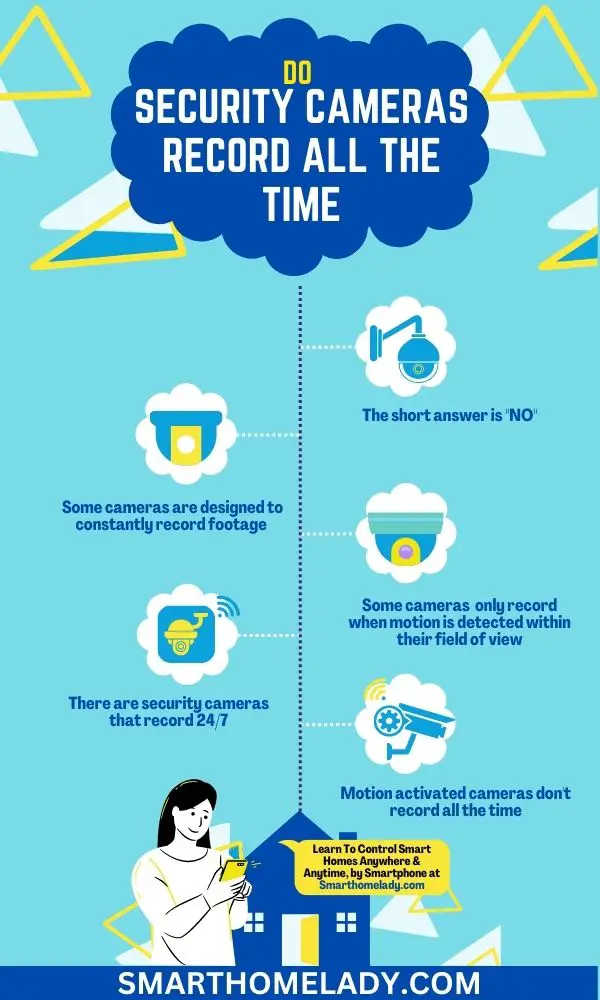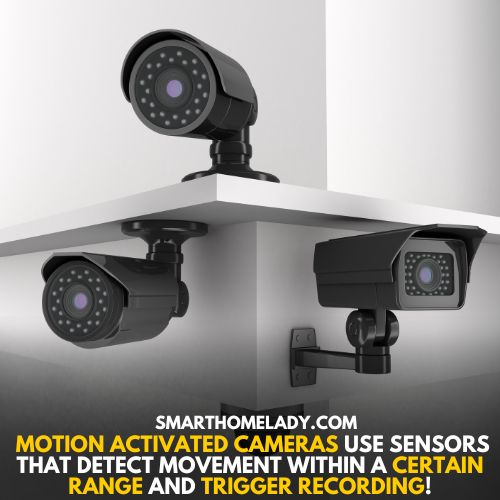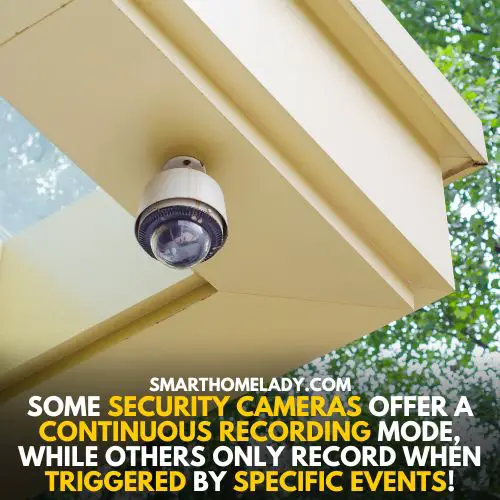As an experienced user of security cameras, I am often asked do security cameras record all the time. It’s an important question that many people have when they’re considering installing surveillance equipment in their homes or businesses.
In this article, I will answer this question and tell you whether your security camera record all the time or just when motion is detected. So, let’s discuss it.

Contents
- 1 Do home security cameras record all the time – Exact Answer
- 2 Do security cameras record 24/7 – Continuous Recording Cameras Do
- 3 Do Motion Cameras Record All the Time? -Motion-Activated Cameras
- 4 Scheduled Recording Cameras Records On Schedule
- 5 Do wireless cameras record all the time
- 6 Do Outdoor Security Cameras Record All The Time
- 7 Factors that affect the recording time Of Security Cameras
- 8 How Long Do Home Security Cameras Record?
- 9 Do Home Security Cameras Raise Privacy Concerns?
- 10 Do security cameras record everything?
- 11 How long do security cameras keep footage?
- 12 Do motion sensor cameras record all the time?
- 13 Can all cameras hear you?
- 14 Conclusion
Do home security cameras record all the time – Exact Answer
The short answer is “NO”, but there are several factors to consider.
Firstly, it depends on the type of camera you have installed. Some cameras are designed to constantly record footage and store it on a hard drive or cloud-based storage system.
Others only record when motion is detected within their field of view. There are also cameras that can be programmed to only record during certain times of day, such as business hours or after-hours activity.
Understanding these differences will help you choose the right camera for your needs and ensure that you’re getting the most out of your investment in security technology.
So, let’s discuss types of security cameras on the basis of the recording.
Do security cameras record 24/7 – Continuous Recording Cameras Do
Security cameras are essential for monitoring and deterring criminal activity. But one question that often arises is; do security cameras record all the time?
The answer is “YES.” There are security cameras that record 24/7. For instance, most continuous recording cameras offer 24/7 monitoring.
Continuous recording cameras capture every movement within their field of view, which makes them ideal for surveillance purposes. They can record footage continuously without any interruption until data storage capacity is reached.
At this point, the oldest footage will be overwritten to make room for new recordings.
Continuous recording cameras provide round-the-clock surveillance coverage by capturing everything that occurs in their vicinity. With adequate data storage capacity, they can store vast amounts of footage before overwriting old recordings.
As a security expert, I recommend investing in high-quality continuous recording cameras to ensure maximum protection against potential threats.
Do Motion Cameras Record All the Time? -Motion-Activated Cameras
As an expert security camera user, I often get asked; “do motion cameras record all the time?” The answer is “NO” – not always.
Motion-activated cameras have become increasingly popular due to their efficiency and convenience.
These cameras use sensors that detect movement within a certain range and trigger recording only when there is an activity in the frame.

This method of recording saves battery life and storage space as it eliminates hours of footage where nothing happens.
However, false alarms can occur with motion-activated cameras, especially if they are placed near areas with high foot traffic or objects constantly moving like trees or flags.
It’s important to adjust the sensitivity settings on your camera to reduce these occurrences and ensure you’re only capturing relevant video footage.
Note – When purchasing motion-activated cameras, make sure to check for features such as adjustable sensitivity settings, night vision capabilities, and long battery life.
Scheduled Recording Cameras Records On Schedule
Did you know that according to recent research, 78% of burglars say they would avoid homes with security systems?
With scheduled recording cameras, homeowners can have peace of mind knowing that their property is being monitored at all times.
These cameras allow for customized schedules so that the homeowner can choose when the camera records and when it does not.
Benefits & Drawbacks Of Schedule Recording
| Benefits | Drawbacks |
|---|---|
| Customizable | Evidence loss |
| Storage-saving | Limited coverage |
| Easy navigation | Time-consuming setup |
Scheduled recording cameras offer greater customization but require more effort in terms of setting up and monitoring the schedule.
Do wireless cameras record all the time
No, wireless cameras do not record all the time. They are usually set to motion detection mode, meaning they will only start recording when they detect motion in the area they are monitoring.
It helps to save storage space and battery power, as the camera will not constantly be recording when there is nothing to see.
The type of recording mode used with a wireless camera will depend on the user’s needs and preferences. Some cameras offer both motion-activated and continuous recording, so the user can easily switch between the two depending on the situation.
However, continuous recording will quickly deplete the battery and consume a lot of storage space.
Do Outdoor Security Cameras Record All The Time
Yes, outdoor security cameras can record all the time, but it ultimately depends on the specific camera and its settings.
Many outdoor security cameras are designed to continuously record footage, providing round-the-clock surveillance. These cameras are especially useful for monitoring high-risk areas or properties with a higher risk of theft or vandalism.
However, some outdoor security cameras offer customizable recording options, allowing users to set specific schedules or motion-triggered recording to conserve storage and only capture relevant events.
Factors that affect the recording time Of Security Cameras
The following 7 factors most commonly affect the recording time of security cameras.
- Resolution – The higher the resolution of a security camera, the more storage space it requires to store the recorded footage. Higher resolutions such as 4K or 8K produce clearer images but also result in larger file sizes, reducing the overall recording time.
- Compression – Different compression techniques are used to reduce the size of video files without compromising quality. However, more compressed footage may result in lower image quality and shorter recording time.
- Frame Rate – The frame rate at which a security camera records impacts the recording time. Higher frame rates, such as 60 frames per second, produce smoother videos but require more storage space. Lower frame rates, like 30 frames per second, conserve storage but may result in slightly choppy footage.
- Storage Capacity – The capacity of the storage device, such as a hard drive or network video recorder (NVR), directly affects the recording time. Larger storage capacities allow for longer recordings before the need for data deletion or overwriting.
- Motion Detection – Many security cameras offer motion detection features, which only record when motion is detected in the camera’s field of view. This can significantly extend the recording time as it eliminates the need to continuously record uneventful periods.
- Continuous Recording vs. Event-Based Recording – Some security cameras offer a continuous recording mode, while others only record when triggered by specific events. Event-based recording conserves storage space and extends the recording time.
- Lighting Conditions – Poor lighting conditions may require security cameras to use higher ISO settings or longer exposure times, resulting in larger file sizes and shorter recording times. Adequate lighting can help optimize storage usage and extend the recording duration.
By carefully considering these factors, you can ensure that your security camera system meets your specific recording needs.

How Long Do Home Security Cameras Record?
Most home security cameras record for 14 to 30 days.
Home security cameras can record for varying durations depending on several factors. Typically, the length of recording time is determined by the camera’s storage capacity and the settings you choose.
Some cameras offer continuous recording, allowing them to record 24/7 until storage is full, while others only record when motion is detected.
To maximize recording time, consider opting for cameras with larger storage capacities or utilizing additional storage options like cloud storage or external hard drives.
Relevant Readings
- What Happens If You Unplug A Security Camera?
- Security Cameras That Work When Power Goes Out?
- Why Do Security Cameras Have Green Lights? Reasons
Frequently Asked Questions FAQs
Do Home Security Cameras Raise Privacy Concerns?
Yes, home security cameras can raise privacy concerns. While they are designed to enhance security and provide peace of mind, they also have the potential to invade privacy if not used responsibly.
It is important to consider the placement of cameras, ensuring they do not capture areas where privacy is expected, such as bedrooms or bathrooms.
Additionally, it is crucial to inform individuals who may be recorded by the cameras and respect their privacy rights.
Do security cameras record everything?
No, security cameras do not record everything. Most modern security cameras are equipped with motion sensors that activate the recording function only when motion is detected.
It helps conserve storage space and ensures that footage is only captured when something of interest occurs.
However, it is important to note that some cameras may have continuous recording capabilities, but this is typically specified in their features or settings.
How long do security cameras keep footage?
Generally, footage can be stored for 14 to 30 days before being overwritten, depending on the settings and the amount of recorded activity.
The duration for which security cameras keep footage varies depending on factors such as the camera’s storage capacity and settings.
Some cameras may have built-in storage, while others may rely on external storage devices or cloud-based systems.
Do motion sensor cameras record all the time?
No, motion sensor cameras do not record all the time. These cameras are designed to detect motion and start recording when activity is sensed within their field of view.
By activating recording only when motion is detected, motion sensor cameras ensure that you capture relevant events rather than continuously recording empty scenes.
Can all cameras hear you?
No, not all cameras can hear you. While some security cameras are equipped with built-in audio capabilities and can record audio along with video, others may only capture visuals.
It is essential to review the specifications of the camera you are considering to determine if it has audio recording capabilities.
Additionally, it is important to comply with local laws and regulations regarding audio recording, as it may involve additional privacy considerations.
Conclusion
So, I can confidently say that not all cameras record all the time. There are different types of security cameras available in the market that cater to varying needs and preferences.
Continuous recording cameras capture footage non-stop without any breaks. On the other hand, motion-activated cameras only start recording when they detect movement within their range.
When choosing a security camera system, it’s essential to consider various factors such as location, purpose, and budget.
As an expert in this field, I highly recommend researching thoroughly before making any purchases to ensure you get the best value for your money while meeting your specific needs.
Citation
- Hollis, M. E. (2019). Security or surveillance: Examination of CCTV camera usage in the 21st century. Criminology & Pub. Pol’y, 18, 131. (Source Link)
- Ratcliffe, J. H., Taniguchi, T., & Taylor, R. B. (2009). The crime reduction effects of public CCTV cameras: a multi‐method spatial approach. Justice Quarterly, 26(4), 746-770. (Source Link)
- Elharrouss, O., Almaadeed, N., & Al-Maadeed, S. (2021). A review of video surveillance systems. Journal of Visual Communication and Image Representation, 77, 103116. (Source Link)
- Mitrokhin, A., Fermüller, C., Parameshwara, C., & Aloimonos, Y. (2018, October). Event-based moving object detection and tracking. In 2018 IEEE/RSJ International Conference on Intelligent Robots and Systems (IROS) (pp. 1-9). IEEE. (Source Link)


